Overview
Navigating the complexities of securing Social Security benefits for ADHD can be challenging. Individuals may qualify through either Social Security Disability Insurance (SSDI) or Supplemental Security Income (SSI) by demonstrating how their condition significantly impacts daily functioning and work capabilities. We understand that this process can feel overwhelming, but we’re here to help you through it.
It’s essential to provide comprehensive documentation that clearly outlines the effects of ADHD on your life. The Social Security Administration (SSA) carefully evaluates each claim, and understanding their criteria is crucial. This article outlines the eligibility requirements, giving you the tools to support your claim effectively.
You are not alone in this journey. Many have faced similar challenges and found success with the right information and support. Remember, taking the first step by gathering your documentation can lead you closer to the assistance you deserve. We encourage you to explore this article and empower yourself with the knowledge needed to navigate this process with confidence.
Introduction
Navigating the complexities of Social Security benefits can feel particularly daunting for those with attention deficit hyperactivity disorder (ADHD). We understand that while ADHD isn't explicitly listed among qualifying conditions, many individuals may still find themselves eligible for assistance. By demonstrating the profound impact of their symptoms on daily functioning, they can seek the support they need.
This article is designed to be your guide through the intricacies of applying for Social Security Disability Insurance (SSDI) and Supplemental Security Income (SSI) for ADHD. What challenges might you face in this process? And how can you effectively overcome them to secure the support you deserve? Together, we will explore these questions and more, ensuring you feel empowered every step of the way.
Understand Social Security Benefits for ADHD
Social Security provides two vital forms of support for individuals living with disabilities: Social Security Disability Insurance (SSDI) and Supplemental Security Income (SSI). While attention deficit hyperactivity disorder (ADHD) isn't explicitly listed as an eligible condition, many individuals can still qualify for assistance by demonstrating how their condition significantly impacts their ability to perform daily tasks, raising the question, can you get social security for ADHD? Understanding these differences is essential for those considering support due to ADHD.
SSDI is based on your employment history and contributions to Social Insurance, meaning that applicants need to have a sufficient earnings record. On the other hand, SSI is a need-based program that does not require any prior work history, making it an option for individuals facing financial hardships.
At Turnout, we offer various tools and services designed to help consumers navigate the SSD claims process. Our trained nonlawyer advocates are here to support you without providing legal representation. Recent statistics indicate that around 50% of individuals with ADHD may wonder, can you get social security for ADHD, depending on the severity of their condition and its impact on their everyday lives.
Staying informed about these distinctions and recent updates can empower individuals with ADHD to navigate the support system more effectively. Remember, you are not alone in this journey, and understanding which program best suits your needs is a crucial step toward receiving the assistance you deserve.
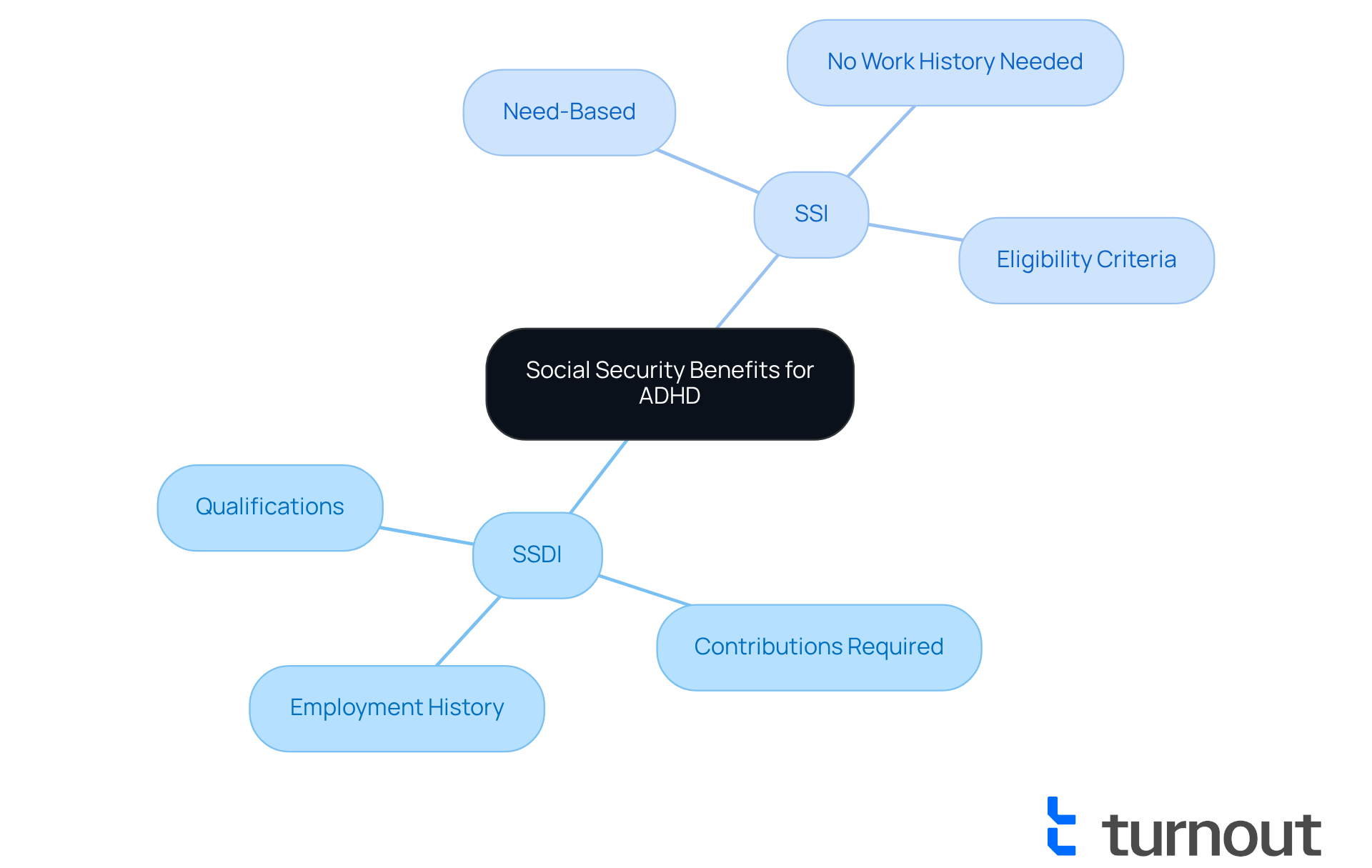
Identify Eligibility Criteria for ADHD Benefits
If you are seeking Social Welfare benefits due to attention deficit hyperactivity disorder (ADHD), it's important to understand [can you get social security for ADHD](https://gillettelawgroup.com/adhd-social-security-disability-benefits) and the requirements. To qualify, you must demonstrate that your condition significantly restricts your ability to engage in substantial gainful activity (SGA); can you get social security for ADHD? This means showing how ADHD affects your everyday activities and professional capabilities.
The Social Security Administration (SSA) uses a five-step evaluation process to determine eligibility. This includes looking at whether you are currently employed, the severity of your condition, and your ability to perform any type of work. We understand that approximately 4% of adults have ADHD, and symptoms like frequent distractibility, hyperactivity, and impulsivity can severely impact job performance.
Healthcare records play a crucial role in this evaluation. They should detail how your ADHD symptoms influence your daily life and work performance. Strong supporting evidence, including medical records, therapy notes, and personal statements, can significantly enhance your chances of a successful claim. Many individuals who have successfully secured assistance submitted thorough documentation that clearly highlighted the limitations imposed by their condition, illustrating their inability to engage in productive work activities.
This comprehensive approach is essential, as it raises the question of how can you get social security for ADHD, given that the SSA is stringent in evaluating claims based solely on this condition, particularly for adults. We recognize that navigating this process can feel overwhelming. Turnout offers tools and services to assist you in this journey. Our trained nonlawyer advocates are here to help you compile the necessary documentation and understand the SSD claims process.
It's important to note that Turnout is not a law firm and does not provide legal advice. Rather, we support you through trained advocates who are qualified to assist with the SSD claims process. Remember, you are not alone in this journey, and we’re here to help you every step of the way.
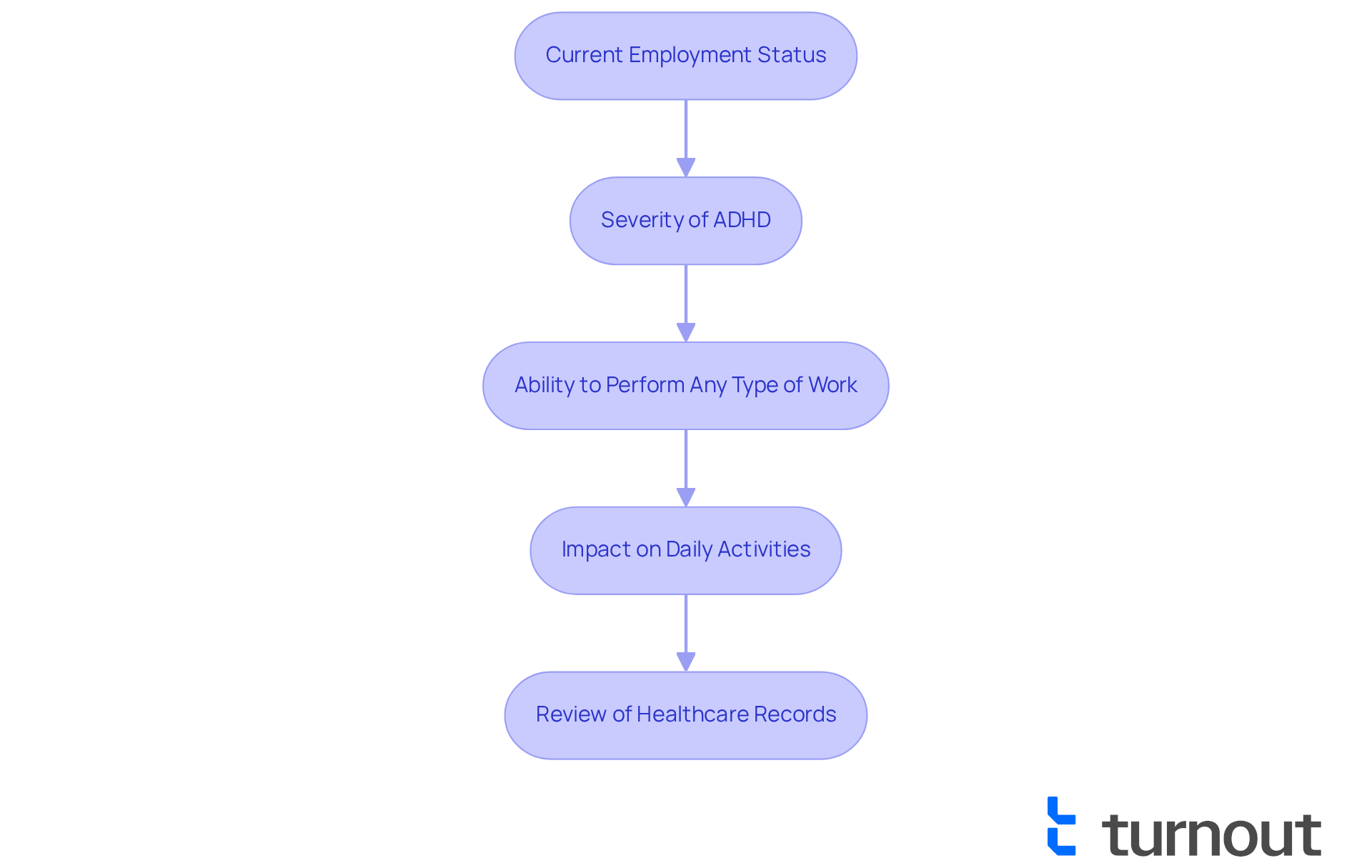
Gather Required Documentation for Your Application
When seeking Social Insurance benefits for attention deficit hyperactivity disorder (ADHD), it is important to ask, can you get social security for ADHD by collecting thorough documentation to support your claim? This includes:
- Medical Records: Detailed records from healthcare providers that outline your ADHD diagnosis, treatment history, and the condition's impact on your daily life. Robust supporting medical evidence is essential for approval, as the Social Welfare Administration (SSA) assesses how ADHD affects your ability to perform job-related tasks, leading to inquiries about whether you can get social security for ADHD.
- Educational Records: For children, this may include Individualized Education Programs (IEPs), report cards, and teacher evaluations that illustrate how ADHD impacts academic performance. To determine if can you get social security for ADHD, evidence of significant impairment in school or relationships is necessary for Supplemental Security Income (SSI) eligibility.
- Personal Statements: Written accounts from family members, friends, or colleagues that describe how ADHD affects your capability to perform tasks and function in daily life. These statements can provide valuable context to your application.
- Work History: Documentation of your employment background, including job descriptions and any adjustments made by employers due to your condition. The SSA will evaluate if your condition impacts your ability to work, which raises the question of can you get social security for ADHD.
Collecting these documents in advance will not only streamline the application process but also strengthen your case. As we look ahead to 2025, the SSA will require updated medical documentation and evidence of ongoing symptoms to assess if can you get social security for ADHD, including specific criteria that focus on how ADHD affects daily functioning and work ability. Statistics indicate that claims with comprehensive documentation have a higher success rate, emphasizing the importance of thorough preparation. Remember, you're not alone in this journey, and we’re here to help you every step of the way.
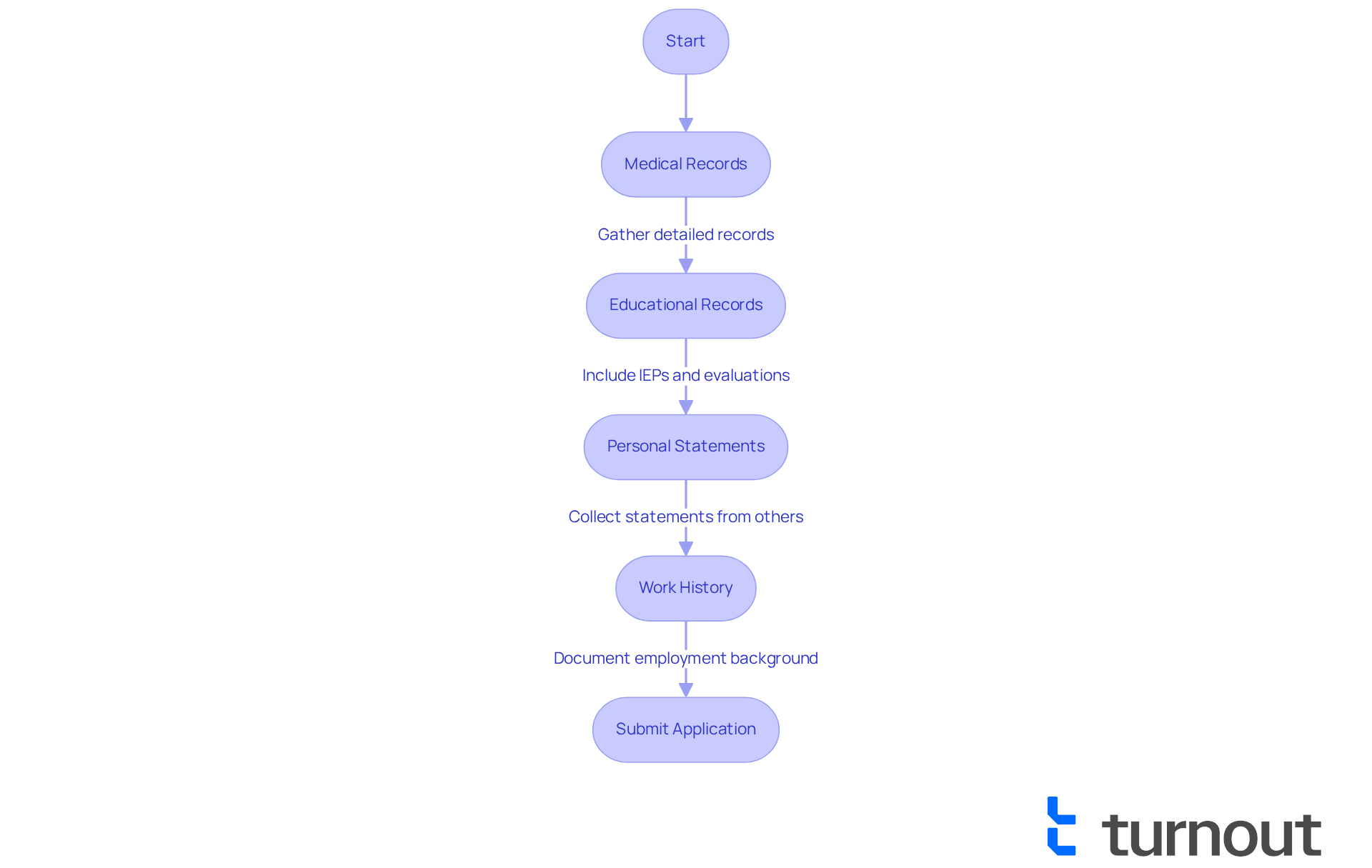
Follow the Application Process for Social Security Benefits
While applying for Social Security benefits for ADHD can feel overwhelming, it's important to ask, can you get social security for ADHD, and remember that you’re not alone in this journey. Here’s a supportive guide to help you through the process:
- Complete the Application: You can apply online at the SSA website, by phone, or in person at your local Social Services office. Make sure to fill out all required forms accurately—every detail matters.
- Submit Documentation: Along with your application, gather and submit all documentation that supports your claim. This includes medical records, educational records, and personal statements. Providing thorough documentation can strengthen your case.
- Utilize Turnout's Support: We understand that navigating the SSD claims process can be challenging. Consider leveraging Turnout's trained nonlawyer advocates who can assist you. They’re here to help you understand the requirements and gather necessary documentation.
- Attend an Interview: In some cases, you may be required to attend an interview. Be prepared to discuss your condition and how it affects your daily life and work. Remember, this is your opportunity to share your story.
- Wait for a Decision: After submitting your application, the SSA will review your case and make a determination. This process can take several months, so patience is key. It's common to feel anxious during this time, but rest assured, you’re taking important steps.
- Follow Up: If you do not hear back within the expected timeframe, don’t hesitate to follow up with the SSA to check on the status of your application. Turnout can also assist you in this follow-up process, ensuring you stay informed about your claim. Remember, you deserve support every step of the way.
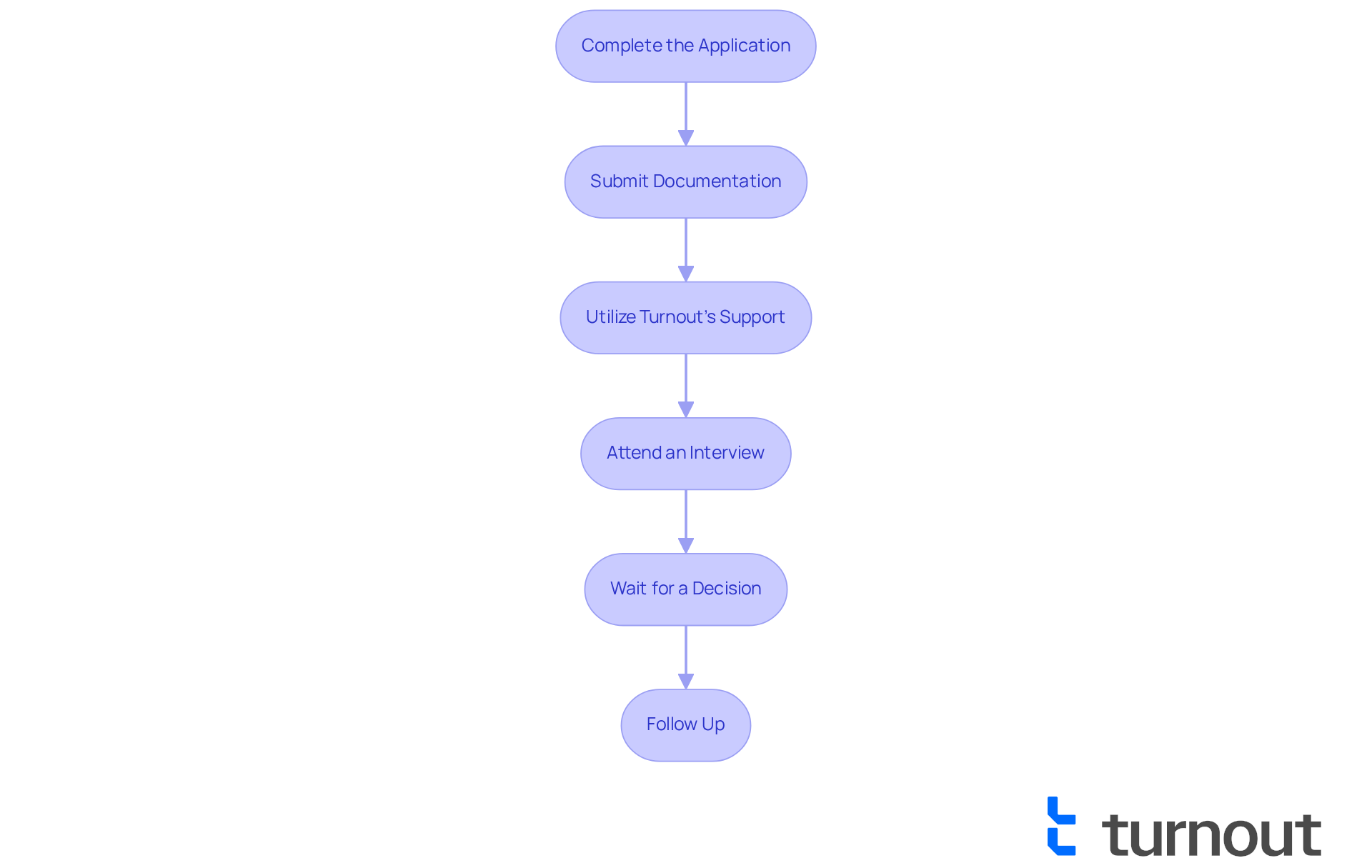
Troubleshoot Common Application Challenges
The journey of applying for Social Security benefits can often lead to the question, can you get social security for ADHD? We understand that many applicants face common obstacles. Here are some supportive tips to guide you through:
- Insufficient Medical Evidence: It’s crucial to ensure your medical records are thorough and clearly document the severity of your ADHD. If needed, don't hesitate to request additional evaluations from your healthcare provider. Comprehensive treatment notes and medical source statements that address limitations related to employment are vital for strengthening your case.
- Application Denials: If your application is denied, it's important not to feel discouraged. Carefully review the denial letter to understand the reasons behind it, and consider appealing the decision. Gathering more evidence or clarifying your documentation can significantly enhance your appeal. Remember, statistics show that around 65-70% of initial SSDI applications are denied, but appealing can improve your chances—especially at the Administrative Law Judge (ALJ) Hearing stage, where approximately 35% of cases are won.
- Long Wait Times: The application process can be lengthy, with average wait times for decisions after appeals reaching around 15 months. Staying organized and keeping track of all communications with the SSA is essential. If you experience significant delays, consider reaching out to the SSA for updates.
- Misunderstanding of SGA: Many applicants mistakenly believe they can work while receiving assistance. It’s important to understand the Substantial Gainful Activity (SGA) limits—$1,620 monthly for non-blind individuals in 2025—to avoid jeopardizing your benefits. Exceeding this threshold can nearly automatically render you ineligible for receiving SSDI support.
Real-World Example: Consider the story of a claimant who faced an initial denial for ADHD support, highlighting the concern of whether can you get social security for ADHD. They successfully appealed by collecting extra medical evidence and addressing discrepancies in their application. This proactive approach not only preserved their original application date for retroactive benefits but also led to a favorable decision during the hearing.
- Advocate Insights: Disability advocates emphasize the importance of thorough preparation and timely submissions. They recommend acting quickly after receiving a denial, as you only have 60 days to file an appeal. By addressing common mistakes and ensuring consistency across all documentation, applicants can significantly improve their chances of approval. Remember, you are not alone in this journey—Turnout's trained advocates are here to support you through this process, providing the guidance you need to navigate these challenges effectively.
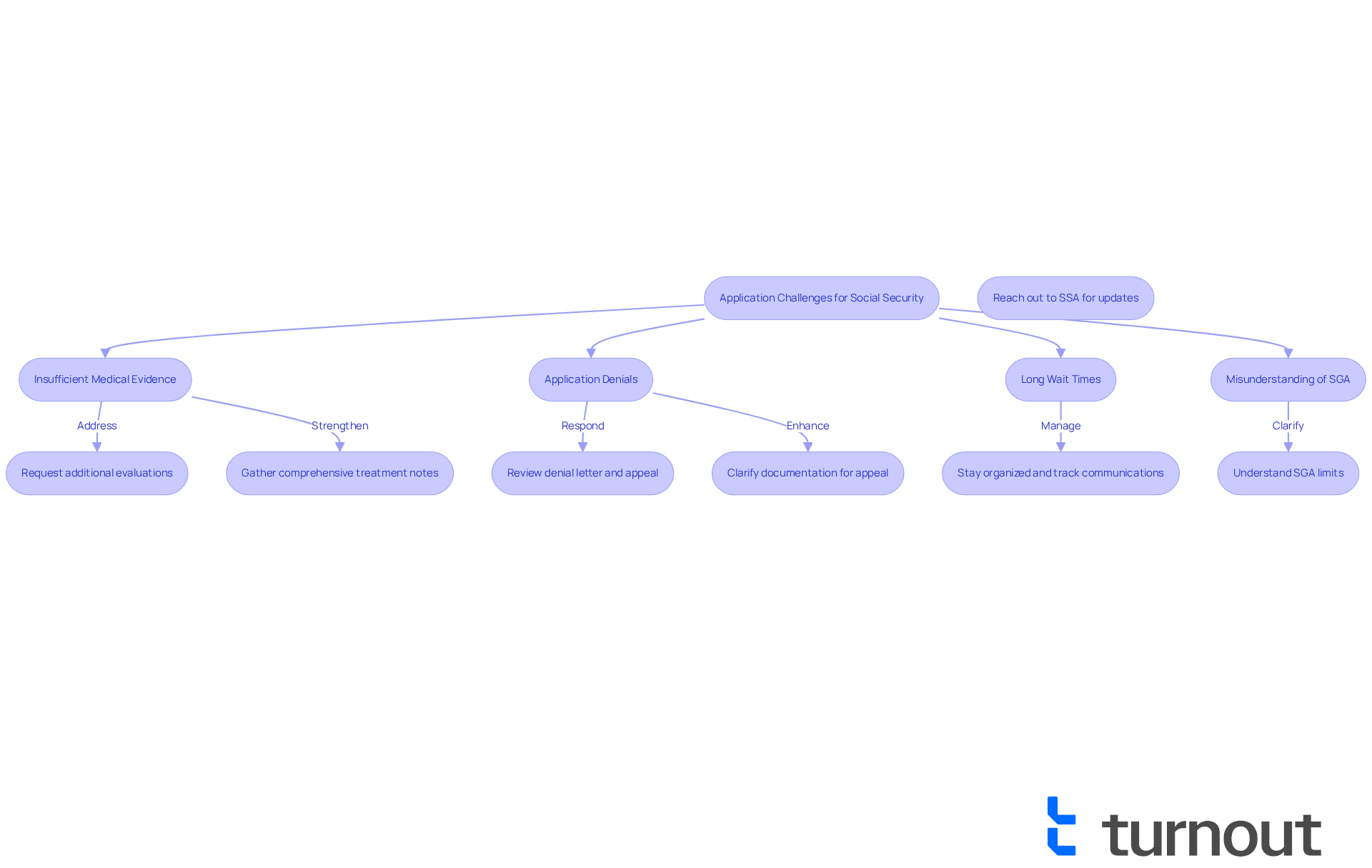
Conclusion
Understanding the intricacies of securing Social Security benefits for ADHD can feel overwhelming. We recognize that while ADHD may not be explicitly listed as a qualifying condition, many individuals can still access support by demonstrating how their symptoms significantly hinder daily functioning and work capabilities. By becoming aware of the available programs—SSDI and SSI—along with their eligibility requirements, you empower yourself to pursue the assistance you need.
Key insights emphasize the importance of thorough documentation, including:
- Medical records
- Personal statements
- Educational evaluations
These elements are vital in illustrating the severity of ADHD and its impact on daily life. It's common to feel uncertain about the application process and potential challenges, but understanding these aspects can help you prepare more effectively, increasing your chances of approval. Utilizing support services, such as those offered by Turnout, can further enhance the likelihood of a successful claim.
Ultimately, approaching the process of seeking Social Security benefits for ADHD with diligence and perseverance is essential. By gathering comprehensive documentation, understanding eligibility criteria, and being prepared for potential obstacles, you can advocate for yourself more effectively. The journey may seem daunting, but with the right resources and support, achieving the assistance needed to manage ADHD is within your reach. Remember, you are not alone in this journey; we’re here to help you every step of the way.
Frequently Asked Questions
What types of Social Security benefits are available for individuals with ADHD?
The two main forms of support available are Social Security Disability Insurance (SSDI) and Supplemental Security Income (SSI).
Is ADHD explicitly listed as a condition that qualifies for Social Security benefits?
No, ADHD is not explicitly listed as an eligible condition, but individuals can qualify by demonstrating how their condition significantly impacts their ability to perform daily tasks.
What is the difference between SSDI and SSI?
SSDI is based on your employment history and contributions to Social Insurance, while SSI is a need-based program that does not require any prior work history.
Who can benefit from SSI?
SSI is an option for individuals facing financial hardships and does not require a work history.
How can individuals with ADHD demonstrate their eligibility for Social Security benefits?
They must show that their condition significantly restricts their ability to engage in substantial gainful activity (SGA) and how ADHD affects their everyday activities and professional capabilities.
What evaluation process does the Social Security Administration (SSA) use to determine eligibility?
The SSA uses a five-step evaluation process that considers current employment status, the severity of the condition, and the ability to perform any type of work.
What role do healthcare records play in the eligibility evaluation for ADHD benefits?
Healthcare records are crucial as they should detail how ADHD symptoms influence daily life and work performance, providing strong supporting evidence for claims.
What types of documentation can enhance the chances of a successful claim for ADHD benefits?
Strong supporting evidence includes medical records, therapy notes, and personal statements that clearly highlight the limitations imposed by the condition.
Can Turnout assist individuals in navigating the SSD claims process?
Yes, Turnout offers tools and services to help individuals compile necessary documentation and understand the SSD claims process through trained nonlawyer advocates.
Does Turnout provide legal advice for SSD claims?
No, Turnout is not a law firm and does not provide legal advice; they offer support through trained advocates qualified to assist with the SSD claims process.




